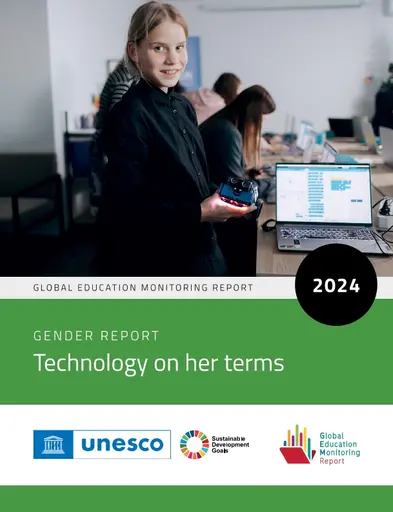
As the EU threatens TikTok lite with a ban and a potential TikTok ban could soon speed through the Senate in the United States, the 2024 GEM Gender Report warns against the use of social media in educational settings to protect young girls’ well-being and learning.
Launched on International Girls in Information and Communications Technology Day and titled “Technology on her terms,” the new report by UNESCO’s Global Education Monitoring (GEM) assesses the progress made towards achieving gender parity across all levels of education.
Whilst the report tells a positive story at the global level for girls’ access and education attainment over the past two decades, examples of stubborn exclusion remain. The report highlights the challenges and risks young girls face in digital learning environments, emphasizing the negative impact of social media on girls’ well-being and education.
Some key findings of the report include:
- Social media usage: By age 15, 43% of girls in the United Kingdom spend one to three hours daily on social media compared to 31% of boys.
- Mental health under strain: Adolescent girls surveyed are twice as likely to report feeling lonely as boys and are likely to suffer an eating disorder in their lives. Facebook-using pre-teenage girls, female secondary school students and female university students reported more body-related image concerns than non-users. Facebook’s own research found that 32% of teenage girls said that when they felt bad about their bodies, Instagram made them feel worse.
- Gender gap in cyberbullying: On average, across OECD countries with available data, 12% of 15-year-old girls reported being cyberbullied, compared to 8% of boys. Image-based sexual abuse is also on the rise, with a third of undergraduate female students in Canada reporting unwanted images or videos.
- STEM gender gap which crystallizes in the technology workforce: Newly released data by the UNESCO Institute for Statistics (UIS) in the report shows that women make up only 35% of tertiary education STEM graduates globally, a share that has not changed in the past 10 years. Women also hold less than 25% of science, engineering, and ICT jobs.

The report says:
“Ensuring women participate on equal terms in shaping the world’s ongoing digital transformation will ensure that technology works for everyone and takes into consideration the needs of all humanity.”
It is crucial for social media platforms to prioritize ethical considerations and create a positive digital environment for girls’ learning and well-being. You can access this report at unesdoc.unesco.org.
TEACH is the largest national education publication in Canada. We support good teachers and teaching and believe in innovation in education.


